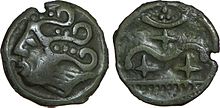Durocasses

The Durocasses were a Gallic tribe dwelling around present-day Dreux during the Roman period.
Name
They are mentioned Durocasis (var. durocacasis) on the Itinerarium Antonini (early 3rd c. AD),[1] as Durocassio on the Tabula Peutingeriana (4–5th c. AD), and as Dorocas on Merovingian coins.[2][3]
The etymology of the ethnonym Durocasses remains unclear. The meaning of the second element -casses, attested in other Gaulish ethnonyms such as Bodiocasses, Sucasses, Tricasses, Veliocasses, or Viducasses, has been debated, but it probably signifies '(curly) hair, hairstyle' (cf. Old Irish chass 'curl'), perhaps referring to a particular warrior coiffure.[4]
The city of Dreux, attested ca. 930 AD as Drocas (Drewes in the 12th c.), is named after the Gallic tribe.[5]
Economy
The production of coins by the Durocasses suggests that they benefited from some economic autonomy. Their wealth probably came from tolls collected on the inland water shipping on the Eure river.[6]
References
- ^ Itinerarium Antonini Augusti, 384:5, 385:1, 385:5.
- ^ Tabula Peutingeriana, 1:3.
- ^ Falileyev 2010, s.v. Durocasses.
- ^ Delamarre 2003, pp. 109–110: "H. Birkhan parvient cependant à la conclusion raisonnable que -casses et cassi- sont deux mots différents, que -casses signifie probablement 'au cheveux bouclés / crépus' ("mit wirrem Kraushaar") et s'explique par la coiffure spéciale des Celtes au combat (une forme celto-germanique *kazdh- permettrait d'unifier le celtique -cass- et les mots v.norr. haddr 'longs cheveux de femme', ags. heord 'chevelure' < *kazdh-to-/ti-)."
- ^ Nègre 1990, p. 154.
- ^ Harmand 1970, p. 107.
Bibliography
- Delamarre, Xavier (2003). Dictionnaire de la langue gauloise: Une approche linguistique du vieux-celtique continental. Errance. ISBN 9782877723695.
- Falileyev, Alexander (2010). Dictionary of Continental Celtic Place-names: A Celtic Companion to the Barrington Atlas of the Greek and Roman World. CMCS. ISBN 978-0955718236.
- Harmand, Jacques (1970). Les Celtes au second age du fer. Fernand Nathan.
- Nègre, Ernest (1990). Toponymie générale de la France. Librairie Droz. ISBN 978-2-600-02883-7.

